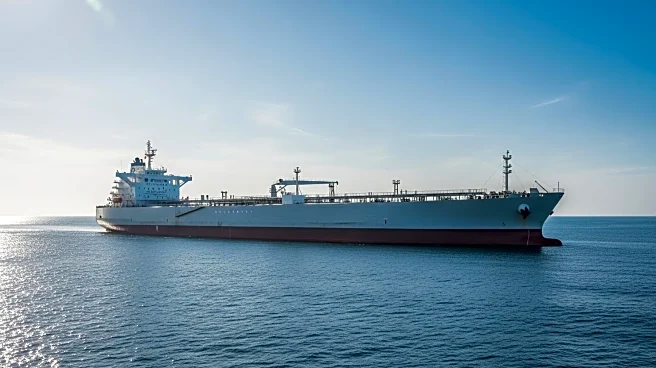What is the story about?
What's Happening?
French authorities are investigating a Benin-flagged oil tanker, Boracay, which is linked to Russian crude shipments. The vessel, blacklisted by the European Union and the UK, is anchored off France's Atlantic coast near Saint-Nazaire. The French Navy alerted prosecutors about a suspected offense involving the tanker, which is part of Russia's 'shadow fleet' used to circumvent international sanctions. These sanctions were imposed by the EU and G7 countries to limit Russian oil exports and reduce revenues supporting Moscow's invasion of Ukraine. The tanker, built in 2007, has a history of irregular and high-risk shipping practices and has undergone multiple name changes, previously known as Kiwala and Pushpa.
Why It's Important?
The investigation into the Boracay tanker highlights ongoing efforts by European nations to enforce sanctions against Russia amid the Russo-Ukrainian war. These sanctions aim to cut off financial support for Russia's military activities by restricting oil exports. The use of a 'shadow fleet' by Russia to bypass these sanctions poses challenges for international enforcement and underscores the complexity of global trade regulations. The outcome of this investigation could impact future enforcement strategies and international relations, particularly in the context of economic sanctions and maritime security.
What's Next?
French prosecutors are building a case against the Boracay tanker, which could lead to legal actions or further sanctions. The investigation may prompt other European countries to increase scrutiny of vessels linked to Russian oil shipments. Additionally, the situation could lead to heightened diplomatic tensions between Russia and European nations, potentially influencing future policy decisions regarding sanctions and international trade. Stakeholders, including political leaders and maritime authorities, will likely monitor developments closely.
Beyond the Headlines
The use of aging tankers with obscure ownership to circumvent sanctions raises ethical and legal questions about maritime practices and international trade compliance. This situation may lead to discussions on improving transparency and accountability in global shipping operations. Furthermore, the investigation could trigger broader debates on the effectiveness of sanctions as a tool for international diplomacy and conflict resolution.

















